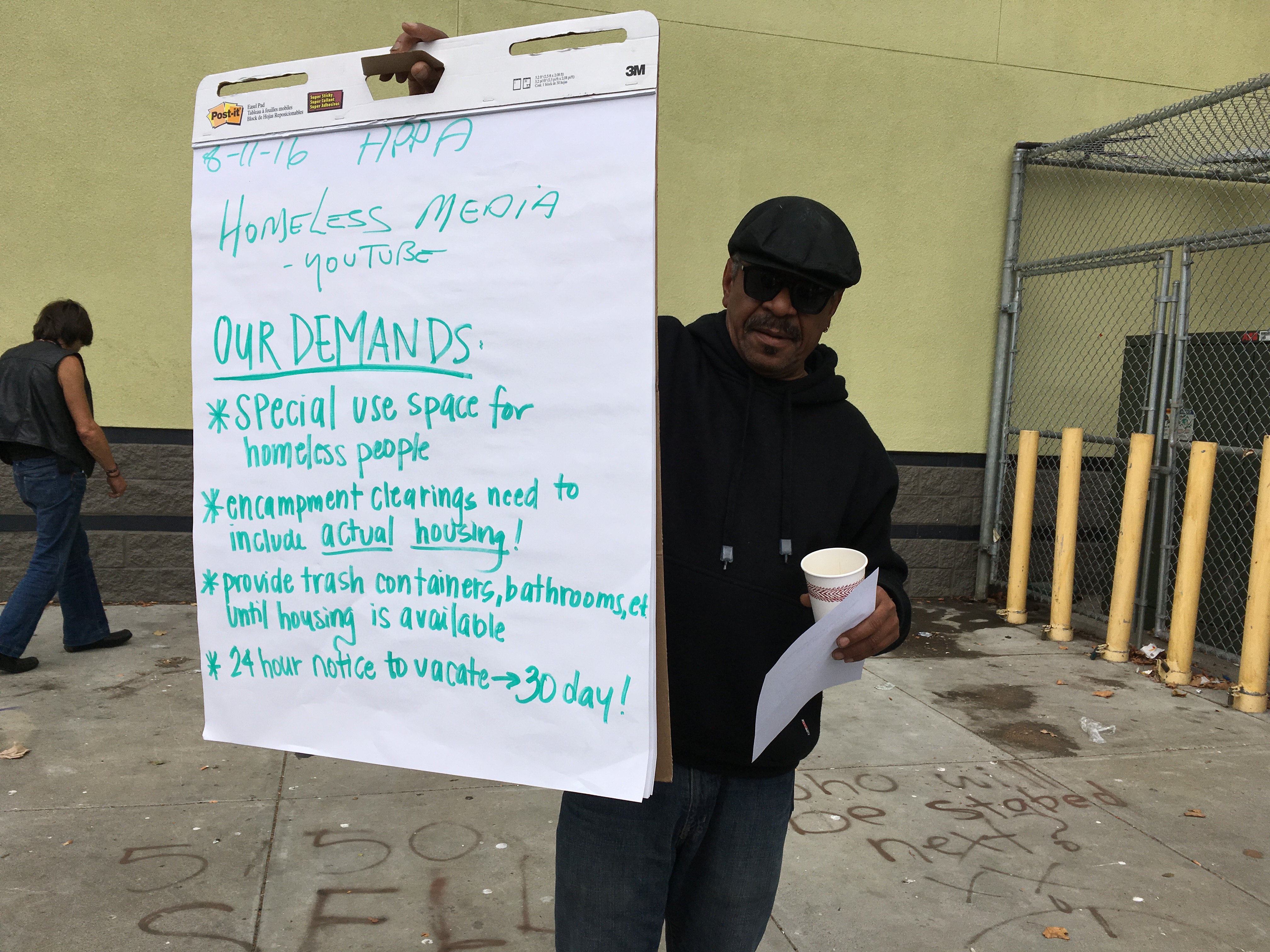 The Homeless People’s Popular Assembly, newly created by the Coalition on Homelessness in June, is a space for people who are living in encampments in San Francisco to voice their opinions about homelessness and the treatment of encampments. The Assembly was birthed from the organization’s Human Rights Workgroup, which saw that people living in tent encampments were not being heard. The assemblies occur once every other week, and have already occurred in the Best Buy, Islais Creek, and Folsom and 19th. Each encampment is encouraged to have their own representatives to report back to the larger group.
The Homeless People’s Popular Assembly, newly created by the Coalition on Homelessness in June, is a space for people who are living in encampments in San Francisco to voice their opinions about homelessness and the treatment of encampments. The Assembly was birthed from the organization’s Human Rights Workgroup, which saw that people living in tent encampments were not being heard. The assemblies occur once every other week, and have already occurred in the Best Buy, Islais Creek, and Folsom and 19th. Each encampment is encouraged to have their own representatives to report back to the larger group.
Bilal Ali, a Human Rights Organizer at the Coalition, facilitates the conversations at the Assembly,with a loud and commanding voice. He does regular outreach to encampment communities on non-Assembly days to let people know when they will be happening and to update people between Assemblies. At each meeting, there is coffee, pastries, and some fruit — and a big megaphone. He often asks people one question : “You’re the Mayor of San Francisco for one day. What do you do?”
There’s a lot of good participation, Bilal says. And it is in this way that he is able to get a sense of what people need and how they want to see their lives improved, on their own terms and on their own turf.
“It’s challenging for folks to come out to meetings at our office. So often, when they leave their belongings in the encampments, they can be thrown away or stolen,” Kelley, one of the organizers of the Assembly, comments. By having meetings at the encampments, the challenges that encampment dwellers face in providing essential feedback are greatly reduced.
Aside from being a forum to raise issues in the encampments, the Assembly also provides key updates about policies that impact and will impact homeless people and encampments, including Proposition Q, which will ban encampments and authorize the City to remove them within 24 hours.
“It’s important to have a group like the Homeless People’s Popular Assembly because it brings the voices of homeless people into the conversation about laws that are going to affect them,” TJ Johnston, a member of the Assembly, says.
The Obama Administration’s U.S. Interagency Council on Homelessness’ 2015 report on homeless encampments recommended that residents of encampments should be included in conversations about encampment clearings. It also condemned the forced dispersal of people from encampment settings, which “is not an appropriate solution” and “accomplishes nothing toward the goal of linking people to permanent housing.”
Members of the Assembly have worked together across encampments to create a demand letter to the City that will be delivered to the Supervisors and to the Mayor as well as social service organizations around the city. The letter outlines key demands of people living in encampments, including a special use space for homeless people to safely camp in San Francisco and encampment clearings that include dignified housing options, not just shelter.
Recently, the Department of Homelessness and Supportive Housing created an Encampment Resolution Team to deal with the increasing encampment removals in the city. Led by Jason Albertson, a clinical social worker who has worked extensively with homeless populations, the Encampment Resolution Team strives to clear encampments in a more humane way and to connect people with services and counseling, rather than simply clearing encampments. Additionally, the Resolution Team provides notices about when encampments will be removed and works with those who are being displaced from their camps.
But problems remain. Despite the good intentions of the Encampment Resolution Team, there is still very little housing that can actually be offered. And the Assembly also emphasizes the need for an independent entity working with encampments that is separate from the City and the City’s often-conflicting interests with the rights and wellbeing of homeless people.
Those who are most often left out of the conversation when creating and implementing solutions for homelessness are homeless people themselves. But the Assembly is a powerhouse that says to the City: “Nothing about us without us.”
If you would like to become involved with or learn more about the Homeless People’s Popular Assembly, please contact Kelley Cutler, Human Rights Organizer at the Coalition on Homelessness, at kcutler@cohsf.org.

